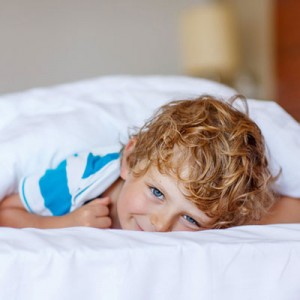 Many parents of children with Autism are concerned about sleep problems. Since April is Autism Awareness month we wanted to take the opportunity to shed some light on the difficulties of sleep and its prevalence within the Autism community. With over 10 years’ experience working with individuals who exhibit Autism Spectrum Disorders (ASD), I have seen first-hand the effects that a disrupted sleep cycle can have on patients with ASD. I cannot tell you how many times I have shown up for a therapy appointment where the parents tell me that their child is “off” today because they only had a couple of hours sleep the previous night. Current research indicates that nearly 80% of children with ASD suffer from sleep difficulties! Which leads us to ask…
Many parents of children with Autism are concerned about sleep problems. Since April is Autism Awareness month we wanted to take the opportunity to shed some light on the difficulties of sleep and its prevalence within the Autism community. With over 10 years’ experience working with individuals who exhibit Autism Spectrum Disorders (ASD), I have seen first-hand the effects that a disrupted sleep cycle can have on patients with ASD. I cannot tell you how many times I have shown up for a therapy appointment where the parents tell me that their child is “off” today because they only had a couple of hours sleep the previous night. Current research indicates that nearly 80% of children with ASD suffer from sleep difficulties! Which leads us to ask…
Why is sleep so important?
- Appropriate sleep helps children grow and develop; most growth hormones are secreted during the sleeping hours.
- Sleep helps children maintain vascular and heart health.
- Sleep keeps hormones in check to help maintain a healthy weight
- Sleep keeps children strong by increasing their immune systems and decreasing the risk for injuries.
- Sleep helps children sustain their attention span, thus increasing their ability to learn.
How much sleep to children really need?
- Preschoolers should be getting ~11-13hrs each night.
- School-aged children should be getting ~10-11hrs each night.
- Adolescents should be getting ~9hrs each night.
Yikes!! These numbers are a far cry from the 3-4hrs that many kiddos with ASD are getting!
What can we do to help children with ASD get more sleep?
- Implement a consistent sleep/wake schedule to help regulate your child’s sleep cycle.
- Avoid naps later in the afternoon to help maintain the new sleep/wake schedule.
- Create a bedtime routine that works for your family. For example, a routine may include an evening snack, pajamas/teeth brushing, reading a story, then lights off for bedtime. By following a routine, children learn to anticipate the order of what comes next; which helps create the new sleep habit.
- Avoid television and computer screens prior to bedtime and during the sleeping hours.
- Make sure your child has an opportunity to play/exercise each day, but not too close to bed time as this may make them more active when you are trying to wind down the day.
- Teach children to fall asleep alone. Children, particularly with ASD, become very accustomed to patterns and habits. If they are used to falling asleep with a parent, then they may need a parent to help them fall back asleep if they wake at any time during the night.
Our conclusion is as follows:
When children with ASD do not sleep, neither do their parents. As such, the perpetual cycle of sleep deprivation affects both the individuals with ASD and their families. For parents reading this, you are not alone. Reach out to your child’s physician(s) and/or therapists as they are part of your child’s team and can be a great support system. For therapists reading this, be advocates for your ASD families and help provide resources that will help end the sleep struggle!
Employment opportunities for First Words Speech Therapy:
Congratulations to our newly hired clinician for the Lake Nona/St.Cloud area. If you’re looking for great SLP opportunities, please contact us for more information.


